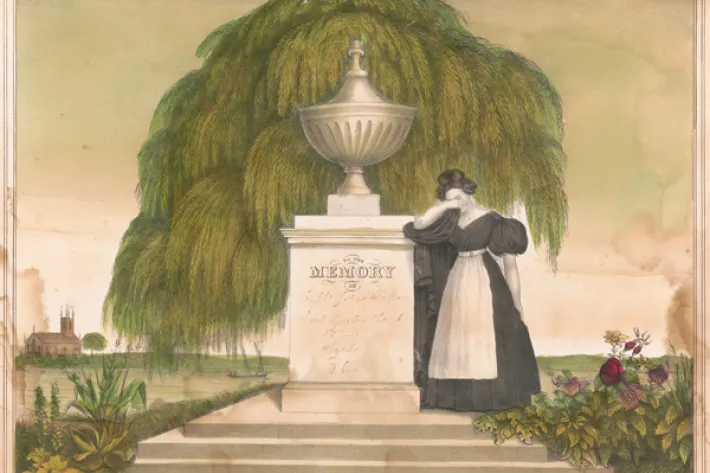Theodosia Burr Alston Mourns the Death of Her Son, 1812

Woman mourning by tomb, lithograph by D.W. Kellogg & Co., ca. 1840. (Library of Congress)
From 1807 to mid-1812, Aaron Burr lived in exile Europe. Theodosia was overjoyed when she learned of her father’s return, but her happiness was short lived. On June 30, Theodosia’s ten-year-old son died of “summer fever” (now known as malaria). Writing from her home in South Carolina, Theodosia pours out her grief in this letter to her father and begins to make plans to visit him in New York City. She set sail for New York on board the ship Patriot on December 31, 1812, and was never seen again.
A Letter from Theodosia Burr Alston to Aaron Burr, August 12, 1812
Seashore, August 12, 1812.
Alas! my dear father, I do live, but how does it happen? Of what am I formed that I live, and why? Of what service can I be in this world, either to you or any one else, with a body reduced to premature old age, and a mind enfeebled and bewildered? Yet, since it is my lot to live, I will endeavor to fulfil my part, and exert myself to my utmost, though this life must henceforth be to me a bed of thorns. Whichever way I turn, the same anguish still assails me. You talk of consolation. Ah! you know not what you have lost. I think Omnipotence could give me no equivalent for my boy; no, none—none.
I wish to see you, and will leave this as soon as possible, though not so soon as you propose. I could not go alone by land, for our coachman is a great drunkard, and requires the presence of a master; and my husband is obliged to wait for a military court of inquiry, which he demanded, and is ordered on him. It will sit on the 10th of August. How long it will be in session I know not. After that we shall set off, though I do not perceive how it is possible to speak with certainty, because Mr. Alston has the command of a brigade here. When we do go, he thinks of going by water, but is not determined. It will probably be late in August before we go. God bless you, my beloved father. Write to me sometimes. What do you wish done with your papers if I should go by land?
I have been reading your letter over again. I am not insensible to your affection, nor quite unworthy of it, though I can offer nothing in return but the love of a broken, deadened heart, still desirous of promoting your happiness, if possible. God bless you.
Theodosia
Source: Theodosia Burr Alston to Aaron Burr, August 12, 1812, The Private Journal of Aaron Burr during His Residence of Four Years in Europe with Selections from His Correspondence, vol. 2, ed. Matthew Davis (New York: Harper & Brothers, 1838), pp. 439–440.
A Letter from Theodosia Burr Alston to Aaron Burr, August 12, 1812
Seashore, August 12, 1812.
Alas! my dear father, I do live, but how does it happen? Of what am I formed that I live, and why? Of what service can I be in this world, either to you or any one else, with a body reduced to premature old age, and a mind enfeebled and bewildered? Yet, since it is my lot to live, I will endeavor to fulfil my part, and exert myself to my utmost, though this life must henceforth be to me a bed of thorns. Whichever way I turn, the same anguish still assails me. You talk of consolation. Ah! you know not what you have lost. I think Omnipotence could give me no equivalent for my boy; no, none—none.
I wish to see you, and will leave this as soon as possible, though not so soon as you propose. I could not go alone by land, for our coachman is a great drunkard, and requires the presence of a master; and my husband is obliged to wait for a military court of inquiry, which he demanded, and is ordered on him . . . When we do go, [Mr. Alston] thinks of going by water, but is not determined. It will probably be late in August before we go. God bless you, my beloved father. Write to me sometimes. What do you wish done with your papers if I should go by land?
I have been reading your letter over again. I am not insensible to your affection, nor quite unworthy of it, though I can offer nothing in return but the love of a broken, deadened heart, still desirous of promoting your happiness, if possible. God bless you.
Theodosia
Source: Theodosia Burr Alston to Aaron Burr, August 12, 1812, The Private Journal of Aaron Burr during His Residence of Four Years in Europe with Selections from His Correspondence, vol. 2, ed. Matthew Davis (New York: Harper & Brothers, 1838), pp. 439–440.
enfeebled - weakened
Omnipotence - unlimited power
Background
From 1807 to mid-1812, Aaron Burr lived in exile Europe. Theodosia was overjoyed when she learned of her father’s return, but her happiness was short lived. On June 30, Theodosia’s ten-year-old son died of “summer fever” (now known as malaria). Writing from her home in South Carolina, Theodosia pours out her grief in this letter to her father and begins to make plans to visit him in New York City. She set sail for New York on board the ship Patriot on December 31, 1812, and was never seen again.
Transcript
A Letter from Theodosia Burr Alston to Aaron Burr, August 12, 1812
Seashore, August 12, 1812.
Alas! my dear father, I do live, but how does it happen? Of what am I formed that I live, and why? Of what service can I be in this world, either to you or any one else, with a body reduced to premature old age, and a mind enfeebled and bewildered? Yet, since it is my lot to live, I will endeavor to fulfil my part, and exert myself to my utmost, though this life must henceforth be to me a bed of thorns. Whichever way I turn, the same anguish still assails me. You talk of consolation. Ah! you know not what you have lost. I think Omnipotence could give me no equivalent for my boy; no, none—none.
I wish to see you, and will leave this as soon as possible, though not so soon as you propose. I could not go alone by land, for our coachman is a great drunkard, and requires the presence of a master; and my husband is obliged to wait for a military court of inquiry, which he demanded, and is ordered on him. It will sit on the 10th of August. How long it will be in session I know not. After that we shall set off, though I do not perceive how it is possible to speak with certainty, because Mr. Alston has the command of a brigade here. When we do go, he thinks of going by water, but is not determined. It will probably be late in August before we go. God bless you, my beloved father. Write to me sometimes. What do you wish done with your papers if I should go by land?
I have been reading your letter over again. I am not insensible to your affection, nor quite unworthy of it, though I can offer nothing in return but the love of a broken, deadened heart, still desirous of promoting your happiness, if possible. God bless you.
Theodosia
Source: Theodosia Burr Alston to Aaron Burr, August 12, 1812, The Private Journal of Aaron Burr during His Residence of Four Years in Europe with Selections from His Correspondence, vol. 2, ed. Matthew Davis (New York: Harper & Brothers, 1838), pp. 439–440.
Excerpt
A Letter from Theodosia Burr Alston to Aaron Burr, August 12, 1812
Seashore, August 12, 1812.
Alas! my dear father, I do live, but how does it happen? Of what am I formed that I live, and why? Of what service can I be in this world, either to you or any one else, with a body reduced to premature old age, and a mind enfeebled and bewildered? Yet, since it is my lot to live, I will endeavor to fulfil my part, and exert myself to my utmost, though this life must henceforth be to me a bed of thorns. Whichever way I turn, the same anguish still assails me. You talk of consolation. Ah! you know not what you have lost. I think Omnipotence could give me no equivalent for my boy; no, none—none.
I wish to see you, and will leave this as soon as possible, though not so soon as you propose. I could not go alone by land, for our coachman is a great drunkard, and requires the presence of a master; and my husband is obliged to wait for a military court of inquiry, which he demanded, and is ordered on him . . . When we do go, [Mr. Alston] thinks of going by water, but is not determined. It will probably be late in August before we go. God bless you, my beloved father. Write to me sometimes. What do you wish done with your papers if I should go by land?
I have been reading your letter over again. I am not insensible to your affection, nor quite unworthy of it, though I can offer nothing in return but the love of a broken, deadened heart, still desirous of promoting your happiness, if possible. God bless you.
Theodosia
Source: Theodosia Burr Alston to Aaron Burr, August 12, 1812, The Private Journal of Aaron Burr during His Residence of Four Years in Europe with Selections from His Correspondence, vol. 2, ed. Matthew Davis (New York: Harper & Brothers, 1838), pp. 439–440.
enfeebled - weakened
Omnipotence - unlimited power
